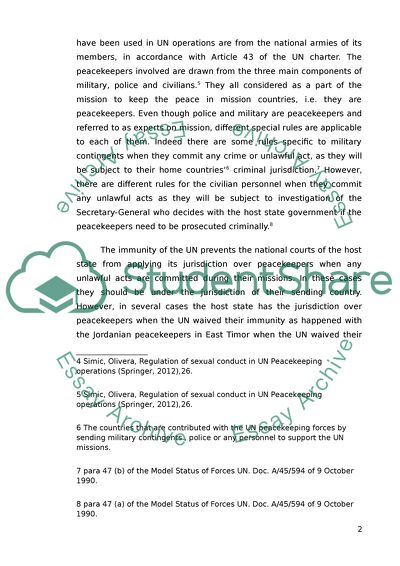StudentShare


Our website is a unique platform where students can share their papers in a matter of giving an example of the work to be done. If you find papers
matching your topic, you may use them only as an example of work. This is 100% legal. You may not submit downloaded papers as your own, that is cheating. Also you
should remember, that this work was alredy submitted once by a student who originally wrote it.
Login
Create an Account
The service is 100% legal
- Home
- Free Samples
- Premium Essays
- Editing Services
- Extra Tools
- Essay Writing Help
- About Us
✕
- Studentshare
- Subjects
- Law
- The Authority of the Secretary-General to Prosecute Peacekeepers
Nobody downloaded yet
The Authority of the Secretary-General to Prosecute Peacekeepers - Thesis Example
Summary
The paper "The Authority of the Secretary-General to Prosecute Peacekeepers" states that Prince Zeid recommended to the UN set up a hybrid court to maintain justice for all victims by prosecuting peacekeepers, who avoid impunity, for their crimes immediately…
Download full paper File format: .doc, available for editing
GRAB THE BEST PAPER94% of users find it useful

- Subject: Law
- Type: Thesis
- Level: Undergraduate
- Pages: 58 (14500 words)
- Downloads: 0
- Author: stanfeest
Extract of sample "The Authority of the Secretary-General to Prosecute Peacekeepers"
Download file to see previous pages
The UN establishment wished to prohibit the use of force in international relationships according to the charter of the United Nations Article 2(4) “All Members shall refrain in their international relations from the threat or use of force against the territorial integrity or political independence of any state, or any other manner inconsistent with the Purposes of the United Nations”. Even though the UN charter prevents the use of force in international relations, there are some exceptions to this, one of them being if the force has been used under the UN charter Articles 41 and 46.
Under Articles 41 and 46, it is possible to use force in international relations when it is necessary to keep world peace. These Articles consider the authorization of the UN to launch peacekeeping operations when that can be necessary for international peace or to help the member countries that have an unstable situation. There is no special army that belongs to the UN for use in peacekeeping operations. This raises the question of who should launch a UN peacekeeping operation. The forces that have been used in UN operations are from the national armies of its members, by Article 43 of the UN charter.
The peacekeepers involved are drawn from the three main components of military, police, and civilians. They are all considered as a part of the mission to keep the peace in mission countries, i.e. they are peacekeepers. Even though police and military are peacekeepers and referred to as experts on mission, different special rules apply to each of them. Indeed there are some rules specific to military contingents when they commit any crime or unlawful act, as they will be subject to their home countries’ criminal jurisdiction. However, there are different rules for the civilian personnel when they commit any unlawful acts as they will be subject to investigation by the Secretary-General who decides with the host state government if the peacekeepers need to be prosecuted criminally.
The immunity of the UN prevents the national courts of the host state from applying its jurisdiction over peacekeepers when any unlawful acts are committed during their missions. ...Download file to see next pages Read More
Under Articles 41 and 46, it is possible to use force in international relations when it is necessary to keep world peace. These Articles consider the authorization of the UN to launch peacekeeping operations when that can be necessary for international peace or to help the member countries that have an unstable situation. There is no special army that belongs to the UN for use in peacekeeping operations. This raises the question of who should launch a UN peacekeeping operation. The forces that have been used in UN operations are from the national armies of its members, by Article 43 of the UN charter.
The peacekeepers involved are drawn from the three main components of military, police, and civilians. They are all considered as a part of the mission to keep the peace in mission countries, i.e. they are peacekeepers. Even though police and military are peacekeepers and referred to as experts on mission, different special rules apply to each of them. Indeed there are some rules specific to military contingents when they commit any crime or unlawful act, as they will be subject to their home countries’ criminal jurisdiction. However, there are different rules for the civilian personnel when they commit any unlawful acts as they will be subject to investigation by the Secretary-General who decides with the host state government if the peacekeepers need to be prosecuted criminally.
The immunity of the UN prevents the national courts of the host state from applying its jurisdiction over peacekeepers when any unlawful acts are committed during their missions. ...Download file to see next pages Read More
sponsored ads
Save Your Time for More Important Things
Let us write or edit the thesis on your topic
"The Authority of the Secretary-General to Prosecute Peacekeepers"
with a personal 20% discount.
GRAB THE BEST PAPER

✕
- TERMS & CONDITIONS
- PRIVACY POLICY
- COOKIES POLICY